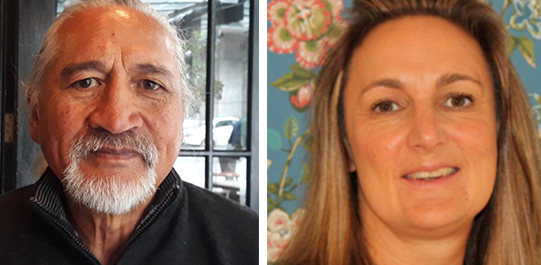Blog: Working restoratively to co-create safe health care – part one
 Jo Wailling, research associate with the Diana Unwin Chair in Restorative Justice at Victoria University of Wellington and Wi Keelan mental health and addiction (MHA) quality improvement programme kaumātua explore how restorative approaches can be used to proactively enhance safe health care.
Jo Wailling, research associate with the Diana Unwin Chair in Restorative Justice at Victoria University of Wellington and Wi Keelan mental health and addiction (MHA) quality improvement programme kaumātua explore how restorative approaches can be used to proactively enhance safe health care.
Jo presented on restorative practice at the Health Quality & Safety Commission’s workshop held in Wellington on 26 June for mental health and addiction leaders for the Te ako mai i ngā pāmamaetanga me te wheako tāngata whaiora me te whānau | Learning from adverse events and consumer, family and whānau experience project. Her previous blog discussed how restorative approaches can meet people’s needs after an adverse event. This first blog of two continues the conversation, focusing on how restorative approaches might support consumer partnership.
We have already discussed how restorative approaches can address the needs of those involved in an adverse event.[1] As well as reacting to harmful events that have already occurred, restorative approaches can also be used proactively to enhance safe health care in a way that exceeds current consumer engagement and empowerment strategies.
Whānau are also important to consider as part of the restorative approach as they are usually the primary support system for a consumer when they return to the community. The question then becomes how will balance be restored so that the consumer relationship with their whānau is repaired, enriched and successful.
In modern health care systems, consumer engagement with whānau support is best practice from the kaupapa Māori perspective, and is emphasised in the Health and Disability Services Standards. Consumer engagement is often referred to as whānau-centred care as seen in the care model promoted by the national Whānau Ora Commissioning Agency. It is a process where consumers of health and disability services, strengthened by their whānau, are encouraged and empowered to actively participate in decisions about the treatment, services and care they need and receive.
The trouble is, when the health sector talks about consumers or their whānau as people to ‘engage’ with or to ‘empower’, we are still assuming that health care practitioners and organisations hold all the power, determine the context and set the rules of the relationship.
However well-intentioned we are, we can end up unconsciously reinforcing existing power imbalances, and fail to regard consumers and their whānau as equal partners and participants in health care provision. The health sector’s ability to build trusting, respectful relationships with consumers and whānau is also eroded. We know this is true in MHA services because consumers and their whānau report experiencing an imbalance of power, a culture of control, and a lack of engagement with health care providers to the Health and Disability Commissioner.
Partnering with consumers, family and whānau in a way that meets the needs of the community is essential if our goal is to incorporate the consumer and whānau voice into service design. With the best of intentions, we can limit their voice if our partnership is based on the needs of the system alone. For example, recruiting consumers and whānau who have knowledge of the health system and are able to understand complex data may exclude or reduce participation from groups and communities who are most impacted and whose voices need to be heard.
Considering what is important for Māori is of particular importance in MHA settings, for we know that Māori are three times more likely than non-Māori to experience mental health problems and suffer disproportionately high rates of seclusion.[2] Approaches that meet the needs of the system, rather than Māori communities, also serve to perpetuate colonisation and disregard the Māori worldview in which wellbeing is understood as a communal responsibility.
Authors: Jo Wailling and Wi Keelan
1. An adverse event is an event with negative reactions or results that are unintended, unexpected or unplanned (often referred to as ‘incidents’ or ‘reportable events’). In practice this usually refers to an event that results in harm to a consumer. Restorative approaches encourage us to consider all those affected by an adverse event, including families, whānau and health care professionals. See:
www.hqsc.govt.nz/our-programmes/adverse-events/projects/adverse-events-reports.
2. Health and Disability Commissioner. 2019. New Zealand’s mental health and addiction services: The monitoring and advocacy report of the Mental Health Commissioner. Wellington: Health and Disability Commissioner. URL: www.hdc.org.nz/media/4688/mental-health-commissioners-monitoring-and-advocacy-report-2018.pdf.
